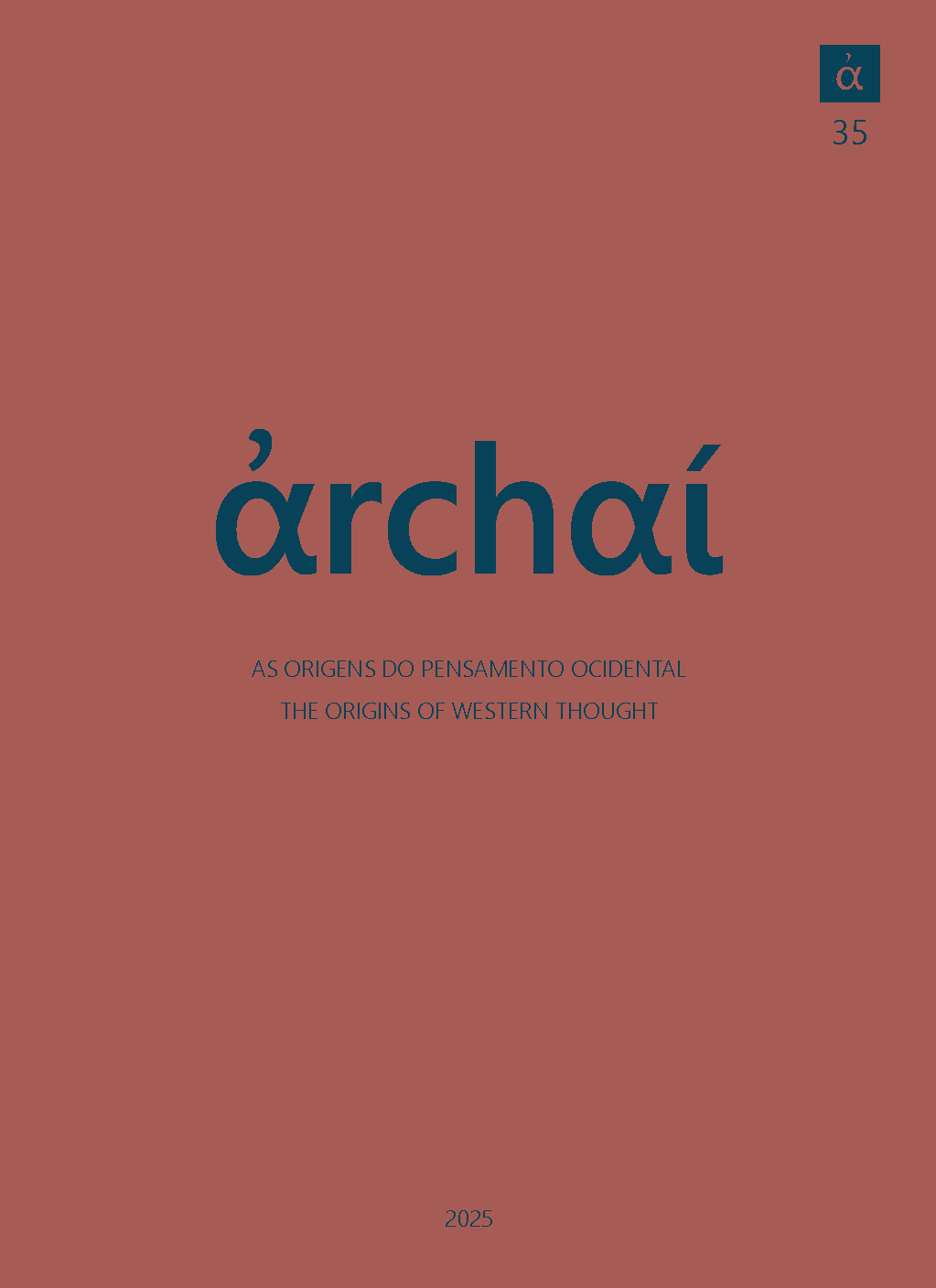Lições de amor em Aquiles Tácio: comentário, tradução e notas de Leucipe e Clitofonte I.7-15
DOI:
https://doi.org/10.14195/1984-249X_35_04Palavras-chave:
Romance antigo, Aquiles Tácio, Tradução, elegia eróticaResumo
Apresentamos a tradução de uma passagem específica do romance Leucipe e Clitofonte, de Aquiles Tácio: a cena em que o personagem principal vai ao encontro de seu primo Clínias e recebe dele valiosos ensinamentos sobre sedução. Tal passagem nos chama a atenção por dialogar com a elegia erótica romana, especialmente com a Ars Amatoria de Ovídio e, pela sua estrutura concisa e unitária que ressoa como um pequeno conto dentro do romance. Buscamos, então, recriar em nossa tradução elementos estéticos e literários que ressoem estes aspectos, especialmente o dinamismo da narrativa, sem perder as nuances líricas - ou elegíacas - do texto.
Downloads
Referências
ÁLVARES, J. (2006). Reading Longus’ Daphnis and Chloe and Achilles Tatius’ Leucippe and Clitophon in counterpoint. In: BYRNE, S. N.; CUEVA, E.; ALVARES, J. (eds). Authors, Authority, and Interpreters in the Ancient Novel: Essays in Honor of Gareth L. Schmeling Ancient Narrative Supplementum 5. Groningen, 2006, p. 1-33.
BARTSCH, S. (1989). Decoding the ancient novel: the reader and the role of description in Heliodorus and Achilles Tatius Princeton, Princeton University Press.
BERMAN, A. (2007). A tradução e a letra ou o Albergue do longínquo Trad. M-H. C. Torres , M. Furlan e A. Guerini . Rio de Janeiro, 7Letras/PGET.
BILLAUT, A. (1998). Le comique d' Achille Tatius et les réalités de l'époque impériale. In: HOFFMANN, P.; TRÉDÉ, M.; AUVRAY-ASSAYAS, C. (eds.). Le rire des anciens. Études de Littérature Ancienne (Tome 8). Paris, Éditions Rue d'Ulm, p.143-158.
BRETHES, R. (2017). Clitophon lecteur d’Ovide. In: BIRAUD, M.; BRIAND, M. (eds). Roman grec et poésie: dialogue des genres et nouveaux enjeux du poétique (Actes du colloque international, Nice, 21-22 mars 2013). Lyon, Maison de l’Orient et de la Méditerranée, p.133-148.
CHEW, K. (2000). Achilles Tatius and parody. The Classical Journal 96, n. 1, p. 57-70.
CHEW, K. (2014). Achilles Tatius, Sophistic Master of Novelistic Conventions. In: CUEVA, Edmund P.; BYRNE, Shannon N. (eds.). A Companion to the Ancient Novel Oxford: Wiley; Blackwell, p.62-75.
CRISTÓBAL LOPEZ, V. (1989). Introdución. In: OVÍDIO. Amores; Arte de Amar; Sobre la cosmética del rostro feminine; Remedios contra el amor Tradución, introdución y notas de V. Cristóbal Lopez. Madrid, Gredos, p.7-186.
DURHAM, B. (1938). Parody in Achilles Tatius. Classical Philology, 33, n. 1, p. 1-19.
GOLDHILL, S. D. (1995). Foucault’s Virginity: Ancient Erotic Fiction and the History of Sexuality. New York/Cambridge, Cambridge University Press.
JOLOWICZ, D. (2021). Latin Poetry in the Ancient Greek Novels Oxford, Oxford University Press.
JONES, M. (2012). Playing the Man: Performing Masculinities in the Ancient Greek Novel Oxford, Oxford University Press .
KONSTAN, D. (1994). Sexual Symmetry: Love in the Ancient Novel and related genres Princeton, Princeton University Press .
LAFER, M. de C. (1996). Hesíodo. Os trabalhos e os dias Tradução, introdução e notas. São Paulo, Iluminuras.
MORALES, H. (2004). Vision and narrative in Achilles Tatius’ Leucippe and Clitophon Cambridge, Cambridge University Press.
NUNES, C. A. (ed.). (1964). Homero. Ilíada São Paulo, Ed. Melhoramentos.
O'SULLIVAN, J.N. (1978). Notes on the text and interpretation of Achilles Tatius I. Classical Quartely 28, n. 2, p. 312-329.
PAES, J. P. (1990). Sob o signo de Judas: digressões de um tradutor de Sterne. In: PAES, J. P. (ed.). A tradução: a ponte necessária. Aspectos e problemas da arte de traduzir. São Paulo, Ed. Ática, p. 91-102.
PAGLIALUNGA, E. (2005). El Ars amandi en la novela de amor griega. Florentia Iliberritana 16, p. 255-274.
PEARCY, L. T. (1978). Achilles Tatius, Leucippe and Clitophon 1.14-15: an unnoticed lacuna? Classical Quarterly 73, n. 2, p. 233-35.
PENA, A. N. (2005). Introdução. In: PENA, A. N. Aquiles Tácio. Os amores de Leucipe e Clitofonte (tradução, introdução e notas). Lisboa, Edições Cosmos, p. XXIII-LXVII.
PLEPELITS, K. (1996). Achilles Tatius. In: SCHMELING, G. (ed.). The Novel in the ancient World Leiden/New York/Köln, Brill, p.387-416.
REEVES, B. T. (2007). The Role of the Ekphrasis in Plot Development: The Painting of Europa and the Bull in Achilles Tatius' "Leucippe and Clitophon". Mnemosyne 60, n. 1, p.87-101.
SANO, L. (2022). Eros Marcial em Leucipe e Clitofonte, de Aquiles Tácio. Classica 35, n. 2, p.1-11.
VILBORG, E. (ed.) (1955). Achilles Tatius: Leucippe and Clitophon Studia Graeca et Latina Gothoburgensia I. Stockholm, Almqvist & Wiksell.
WHITMARSH, T. (2003). Reading for pleasure: narrative, irony and erotics in Achilles Tatius. In: PANAYOTAKIS, S. et al. (eds.). The Ancient Novel and Beyond Leiden/Boston, Brill, p. 191-205.
WHITMARSH, T. (2000). Commentary. In: WHITMARSH, T. (ed.). Achilles Tatius. Leucipe and Clitophon Book I-II. Cambridge, Cambridge University Press , p.117-262.
Downloads
Publicado
Como Citar
Edição
Seção
Licença
Copyright (c) 2025 Emerson Cerdas

Este trabalho está licenciado sob uma licença Creative Commons Attribution 4.0 International License.
Dado o acesso público desta revista, os textos são de uso gratuito, com obrigatoriedade de reconhecimento da autoria original e da publicação inicial nesta revista. O conteúdo das publicações é de total e exclusiva responsabilidade dos autores.
1. Os autores autorizam a publicação do artigo na revista.
2. Os autores garantem que a contribuição é original, responsabilizando-se inteiramente por seu conteúdo em caso de eventual impugnação por parte de terceiros.
3. Os autores garantem que a contribuição que não está em processo de avaliação em outras revistas.
4. Os autores mantêm os direitos autorais e concedem à revista o direito de primeira publicação, sendo o trabalho licenciado sob a Creative Commons Attribution License-BY.
5. Os autores têm permissão e são estimulados a publicar e distribuir seu trabalho on-line após a publicação na revista.
6. Os autores dos trabalhos aprovados autorizam a revista a, após a publicação, ceder seu conteúdo para reprodução em indexadores de conteúdo, bibliotecas virtuais e similares.
7. É reservado aos editores o direito de proceder ajustes textuais e de adequação do artigo às normas da publicação.














